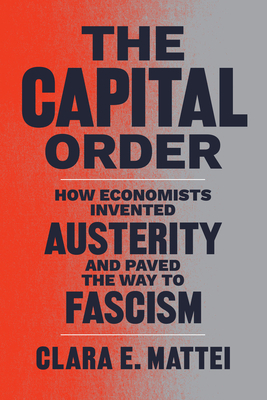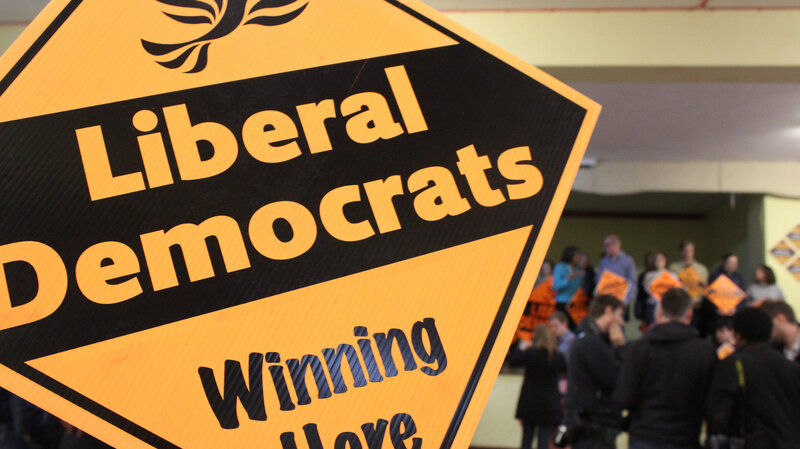As a Liberal Democrat I’m often described as being on the political left. One word shows that this is far from true: “austerity”. To people on the left, especially in Britain, this word brings up a visceral reaction. To them austerity is the quintessence of evil: the crushing of all attempts to promote the public good, perpetrated by a brutal government out to protect the interests of the rich. But to me austerity is a government policy that is often necessary – and is part of a healthy tension that keeps the state efficient. Still, I always like to understand the arguments of people I disagree with, and when I saw a link on my New Statesman email to an article by William Davies entitled Fascism’s liberal admirers, I thought I’d take look. The sub-title was Austerity is a fiction designed to uphold capitalism – and it has a dark history. The pretext (I would not call the article a review) for the was a book by Clara Mattei called The Capital Order – How economists invented austerity and paved the way to Fascism. The subheadings demonstrate what I mean about the left’s attitude.
Which is why I was expecting a lot of nonsense – and by and large that is where the article ended up. But along the way it constructed a narrative that was fr from nonsense. The book is about the rise of Fascism, and how the pre-Fascist government in Italy in the 1920s was being pressured by Britain (as a creditor nation) to adopt austerity policies. The British ruling establishment had taken on the austerity narrative after the First World War, and was delighted when the Fascists in Italy followed through with these policies after they took power. Ms Mattei’s and Mr Davies’s point is that this narrative came about as a reaction to a socialist narrative that the success of war economies showed that there was an alternative to market capitalism, with economies led by, and substantially owned by, the state. Revolution was in the air. The capitalists needed to stamp this thinking out, and they aggressively promoted pro-market policies and a rolling back of state intervention. It was not a narrative based on economic necessity, but one developed to protect vested interests. It is but a short step for Mr Davies to suggest that this is what has been happening in the 21st century, following the financial crash of 2008, and now – with the fall of the Liz Truss government. That, historically, support for austerity led capitalists to embrace Fascism shows how they will turn on democracy to protect their interests, and economics is just camouflage. The fight against austerity is the fight to preserve democracy.
There’s something in this. Pretty much all economic policy, whether capitalist, socialist or anything else, is a conspiracy of vested interests: people try to persuade the public at large that their ideas are for the public good, using any argument that they think might gain traction, spurious or otherwise. That is how large, complex societies get anything done. Truth is incidental. And, though I’m not an expert, I think that the British ruling establishment over-reacted to the prospect of more socialist ways of working in the 1920s, and their arguments in support of the package of policies that Mr Davies calls “austerity” do not stand the test of time (though economies in the 1920s swiftly moved to growth after austerity – and it was not until the depression of the 1930s that the narrative seriously came to be questioned). After all they did something quite different after the next war, and capitalism (and wider society too) has never flourished more. It is a stretch to say that the same applies to 21st century episodes of austerity in Britain and the Eurozone, but there is a case to answer. Many of the justifications put up by the supporters of austerity policies were nonsense. So if you want to believe that austerity is always and everywhere economic nonsense promoted by self-interest, you will always find plenty of evidence. That is the insight I gained by the article. Evidence, but not proof.
The resources required to make an economy work are always limited. The bottom line is that economic policy will always be limited by resources, and that the more efficiently those resources are used, the more successful an economy will be. There are times when it pays a government to spend money to do things that are useless. Keynes wrote of getting people to dig holes and fill them in again; Hitler ramped up spending on armaments. That is when the economy is running slack and needs pump-priming. The people digging holes or making tanks spend their wages buying other things, creating a virtuous circle of job creation. Austerity is a bad idea at such times. But when the economy is running at close to capacity, or overheating (as is the case in most developed economies in 2022) then that logic disappears. If anybody, anywhere is employed doing things that don’t enhance society, it is means that the economy is running less efficiently than it should. If the government is running inefficiently, then austerity policies can be justified to cut waste, and move people from doing useless things in the public sector to being more useful in the private one. That is the basic intellectual case for austerity. And it is why governments of all economic stripes, capitalist and otherwise, will often carry out austerity policies. For example, Cuba’s socialist government after Soviet subsidies were withdrawn in the 1990s.
It goes deeper. All human organisations have a tendency to become complacent, and settle into inefficient ways of working to minimise internal conflict. In private enterprise this tendency is tempered by the need to compete, and by downturns in the business cycle. I well remember this from my work days. Things would seem to be going well, and then there would be a crisis. Savings had to be made, usually, eventually, entailing job losses. Workers were disappointed and often angry; but the overall effect of this stop-start was a more healthy, efficient and focused organisation. Some good things might be lost in the process, but that was outweighed by the reduction in waste and follies curtailed. The public sector is generally insulated from such commercial pressures, and so has an even greater tendency to become inefficient. Bouts of austerity act as a check on this, and force managers to focus on what needs to be done – though they won’t thank you for it.
But the timing is often difficult to decide. It is not always easy to tell if an economy is running slack or close to capacity. There is an argument to be had about that in Britain in the 2010s. But the real problems happen over resources transferred between countries. Economies are often sustained by using resources provided by other countries. But this creates international obligations – as well as the temptation to profligacy. If people in one country supply resources to people in another one, they do so because they expect to be repaid in some shape or form, usually profitably. If it turns out that poor economic management (or any other problem) puts the repayment in jeopardy, then the creditor countries will often insist on austerity. This is not always the right thing to do, but the basic premise that the debtor country is consuming more resources than it is producing, and needs to adjust to something more sustainable. This can be a capitalist conspiracy, but it doesn’t have to be. The politics around it get messy with truth, as usual, a casualty; creditors accuse debtors of profligacy – debtors accuse creditors of gratuitous cruelty. Some governments practice austerity simply to prevent getting into this sort of situation – the socialist president of Mexico, Andrés Manuel López Obrador, is an exemplar of this.
All this is common sense. Austerity – and this is best understood as cuts to government spending, rather than raising taxes – can simply be about the management of finite resources in a changeable environment, and doesn’t have to be ideological. So why do the British left react so violently to the idea? I’m not sure how deep the history goes. The New Labour of Tony Blair and Gordon Brown of the mid-1990s embraced austerity, but they were hardly of the left – but the left seemed happy enough to keep in tow. I think the issue originated from the coalition government of 2010. In the five or so years before this, the state payroll, direct and indirect, had expanded considerably. Many parts of the state had become very inefficient. At the time I could see this in both education (I was a school governor) and health (I was following health affairs closely, as I was looking for a job there). In both areas I could see over-complicated management structures and performance grids, and lightweight policies implemented to placate some lobbyist or other. Capital funding was tied to a bidding process that required the use of consultants on both sides. The bidding process was a matter of verbiage – the trick being to find the right trigger phrases. I read my borough’s bid for primary school expansion (which was successful), and it seemed to carefully saying nothing at all – but it was the work of many senior people, with external advice. In the NHS, funding was driven by something called “World Class Commissioning” – a vastly over-engineered superstructure designed to provide employment to consultants and middle managers. I could go on. The writing was already on the wall before Labour lost the election of 2010, as the crash put government finances under strain, but the government had been slow to apply austerity. Not so the incoming Conservative-Lib Dem coalition. They put in place a vicious programme of spending cuts. Suddenly a whole class of public sector employee found their livelihood at risk – and worse, political leaders were suggesting that their endeavours had all been a waste of time. That triggered an angry backlash. And just as the right tends to be controlled by the interests of capitalists, the left tends to be controlled by the interests of state employees.
By and large the angry people were university graduates trained to look for abstract principles to make sense of events. So instead of just protesting against the concrete adverse effects of particular cuts, they spied an abstract idea to focus their anger on: austerity. Austerity was evil; the cuts were not necessary but ideological. Many economists criticised the cuts as excessive, causing a needless recession and economic wasted resources – and this was seized on as evidence of the evils of austerity. As this line of thinking developed in the usual echo-chambers of social media and friendly journals, it morphed into the idea that austerity is always and everywhere evil. Mr Davies’s article shows how entrenched that thinking remains.
And that is a problem. The left seeks to achieve political power, and to do so democratically they must persuade people that they can be trusted. But most people’s attitude to austerity is pragmatic: sometimes it is required. Most people probably have their own hobby horse of perceived government waste that austerity could be used to sort out – though there will be no general agreement on what these actually are. A class of politicians that cannot let the idea that austerity can ever be justified pass their lips are going to find it very hard to win that trust. And yet it is more than easy to campaign convincingly against specific cuts – at a time when so many public services are wilting under pressure, and the public safety net is obviously inadequate in many places. The politically sensible thing to do is to allow for austerity in theory, but oppose it in the here and now: or to follow the example of Gordon Brown who advocated austerity in the mid 1990s, but once in power and having established public trust, launched the expansion of the British state.
The left are part of the Labour Party, but do not control it. The Labour leadership understand well enough the politics of all this. Polls show that they are maintaining credibility on economic management. The left’s obsession with austerity in the abstract undermines their political influence. Which means the advocacy of any good ideas they have is weakened. In a world when many long-held beliefs are being challenged, the left should challenge this shibboleth.







